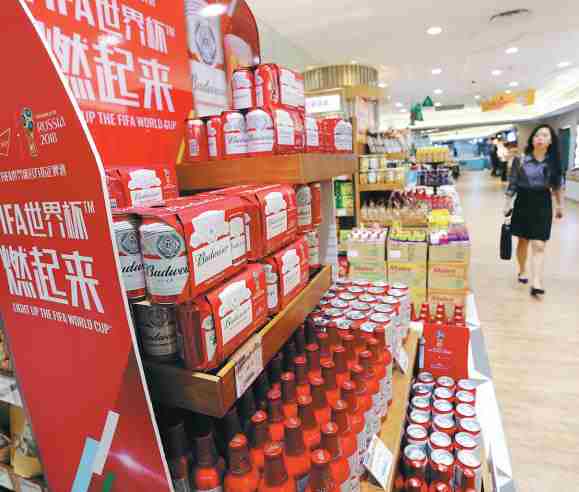
Beer is sold at a 2018 World Cup-themed promotion event at a supermarket in Nanjing, Jiangsu province, on June 7. [Photo by Yu Tian/For China Daily]
Beer sales in China and stock prices of Chinese brewing companies rose ahead of the 2018 FIFA World Cup, which will be held in Russia between June 14 and July 15.
This year, many games in the soccer event, which is held every four years, will be watched by Chinese fans in bars and restaurants where beer consumption is high, especially pricey beers.
Beer sales had already started to pick up in May, with monthly sales volume increasing nearly 100 per cent. According to Tmall statistics, the single-day sales of beer reached 1.3 million bottles on the platform on May 17.
In contrast with the sluggish Shanghai Stock Exchange index, beer stocks have risen, including Yanjing Beer, Chongqing Beer, Lanzhou Huanghe and Pearl River Beer. For example, Pearl River Beer’s share price rose 42.7 per cent in May.
According to Sinolink Securities, the World Cup has boosted the beer sector this summer, which has seen higher temperatures so far compared with previous years.
The country’s major domestic beer manufacturers are increasing their offerings of medium and high-end products. According to Euromonitor International, a marketing research firm, more than 30 per cent of the beer market in China will be medium and high-end products by 2020.
Tsingtao Brewery Co Ltd has developed many high-end products in recent years, including Classic 1903, whole-barley Weissbier and Tsingtao Pilsner, adding to its profitability.
In 2017, the company’s sales volume of its core brand, Tsingtao Beer, reached 37.65 million hectoliters. About 16.25 million hectoliters of its sales volume was from its medium and high-end products such as Augerta, Hong Yun Dang Tou, Classic 1903 and draft beer, which maintained its leading position in the medium and high-end market.
In 2017, the sales revenue from Chongqing Beer’s low-end products such as Chongqing 33 and Shancheng dropped by 2.07 per cent, and that of medium-range products Lebor and Chongqing Guobin declined by 1.81 per cent. However, high-end products including Carlsberg, Tuborg Draft and Chongqing Draft Beer saw revenue grow 8.42 per cent last year.
In the first quarter of this year, Chongqing Beer, a subsidiary of Denmark’s Carlsberg Group in China, sold 214,000 kilolitres of beer, up 3.33 per cent year-on-year, and its revenue reached 813 million yuan, up 10.73 per cent year-on-year. Profits of the beer manufacturer based in the country’s renowned hot pot city increased 56.9 per cent to 75.5 million yuan in the first quarter.
The offline locations of beer sales, such as supermarkets, which used to be the main places for beer promotions, are gradually being replaced by online retailers, catering sites and football-themed bars this year.
Zhu Danpeng, an independent food and beverage analyst, said: “World Cup-themed marketing efforts are focusing less on traditional retailers such as supermarkets because their customers are mainly middle-aged and elderly people, who are price-sensitive and no longer belong to the core audience for soccer games.”
Restaurants and bars are becoming a major battlefield for attracting consumers as their customers tend to be less sensitive to beer prices and are easier to sell medium-and-high end products to, he said.
Tsingtao’s 2017 fiscal report said the catering market took up more than 50 per cent of its sales last year.